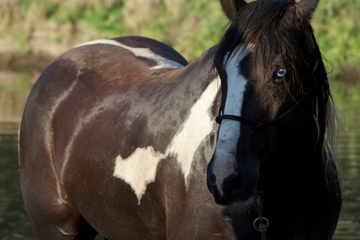
Did you know weight management is important to keep your horse healthy? Just like humans, over or underweight horses will be more prone to health issues that impact their quality of life. Obesity can lead to laminitis, Equine Metabolic Syndrome, and poor cardiovascular health, while underweight horses often have suppressed immune systems and poor performance. You should consult your veterinarian and use weight tapes and body condition scoring to ensure your horse is an ideal weight.
How Much Do Foals Weigh?
A newborn foal weighs about 10% of its mother's weight at birth but grows very quickly. They will double in size over the first few months of life, and most reach their full height by 1 1/2 years old. This can vary slightly for large breeds. Once the foal reaches its full height, you will notice them filling out and becoming less lanky. It takes 3-4 years for their growth plates to solidify, again longer for large breeds such as Drafts, Warmbloods, Friesians, and Andalusians.
How Much Does an Adult Horse Weigh?
Many factors impact a horse's weight, including breed and health, but the average horse weight is between 900 and 1,200 pounds. Miniature horses and small ponies weigh between 100 pounds and 600 pounds. Draft horses, such as Belgians, Percherons, and Clydesdales, can weigh over 1,800 pounds.
Heavy Horses vs. Light Horses
Horse breeds play a significant role in weight. Different breeds have been created for different uses throughout history, just like dogs, goats, and pigs. Horses meant for racing and endurance, like Thoroughbreds, Quarter Horses, and Arabian horses, are lighter, sleeker, and designed to run distances. However, draft breeds, such as Clydesdales and Percherons, were bred larger and stronger to pull carts and plows. The breed's history heavily impacts the horse's overall height and weight.
What Factors Impact A Horse’s Weight?
Diet, level of activity, and certain health conditions can significantly impact a horse's weight. High-fat or sugar diets such as rich pasture and lots of high-quality grain can quickly lead to an overweight horse. Most horses need between 1.5% and 3% of their body weight in feed per day. Matching your horse's dietary needs with its current activity level is important to ensure a healthy weight. For example, a competition horse or a broodmare will have a higher caloric requirement than a pleasure horse ridden once a week.
Health Issues Impacting Weight
It may surprise you to know poor dental health is a leading cause of underweight horses. Sharp points, bad teeth, and hooks can cause horses to stop eating or chew poorly, leading to poor digestion. Check your horse's dental health if you notice changes in their eating habits or weight loss.
Cushing's Disease is a common health issue related to weight gain or loss. This endocrine disorder is caused by a small, benign tumor on the pituitary gland. It results in excessively shaggy coats, difficulty shedding, laminitis, and weight gain. Once diagnosed, Cushing's can be easily managed with medication.
Parasites are commonly associated with weight loss in horses. Parasites consume vital nutrients and lead to deficiencies in the horse. Dull coats, lethargy, and sudden weight loss are all causes for concern. Contact your veterinarian for a fecal exam and recommended deworming protocol.
Seasonal Weight Gain and Loss
It is normal for weight to fluctuate in different seasons. Many horses will gain weight during the summer due to lush grass and temperate weather conditions. Winter is harsher for horses, and they need to burn more calories to stay warm. It is important to monitor your horse for weight loss during cold winter months, especially for senior horses.
How Are Horses Weighed?
There are several ways to weigh a horse. The most accurate method is to use a livestock scale. This is a special type of scale designed to weigh large animals. It can be expensive to purchase and install, so many horse owners prefer a weight tape. This special tape measures the circumference of a horse's girth and gives you a weight estimate. Placing the tape in the correct location is very important to ensure an accurate estimate.
If you don't have a weight tape, you can calculate your horse's weight using a measuring tape and the following formula:
Circumference behind withers x (Circumference behind withers x Body length) / 300 = Total Body Weight in Pounds
The weight tape and weight formula will estimate your horse's body weight closely. Veterinarians will use livestock scales in hospitals before dispensing medications or anesthesia to ensure the proper dosage for the horse.
Horse Body Condition Score
Body condition scoring (BCS) is the best way to determine if your horse is at a healthy weight. This method looks at body fat in six locations on the horse; under the neck, withers, behind the shoulder, back, ribs, and tail head. Each location is scored using a scale of 1-9. An ideal body condition score is 4-6, depending on the horse's breed. 1 means the horse is severely underweight, and a 9 is an extremely overweight horse. Getting comfortable with this method can take some practice, but learning such a valuable tool is worth the time.
Weight and Performance
A healthy weight range will greatly impact your horse's performance. Overweight horses will have difficulty with endurance and cardiovascular health. This can also lead to long-term issues with the horse's heart. However, underweight horses will also perform poorly because they don't have sufficient calories to sustain work.
Monitoring Your Horse's Weight
Keeping track of your horse's body weight can greatly impact your ability to quickly identify diseases and health issues and ensure good overall health and performance. Weight tapes, BCS, and scales are the most common methods for getting accurate weight measurements for horses. If you are concerned about sudden weight gain or loss, contact your veterinarian to review your horse's diet and potential underlying health issues.







